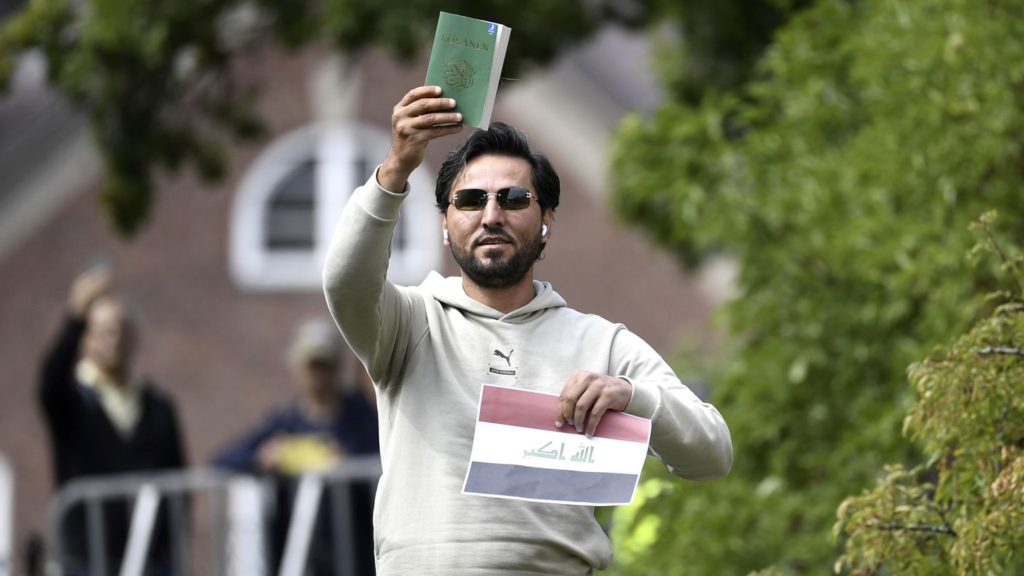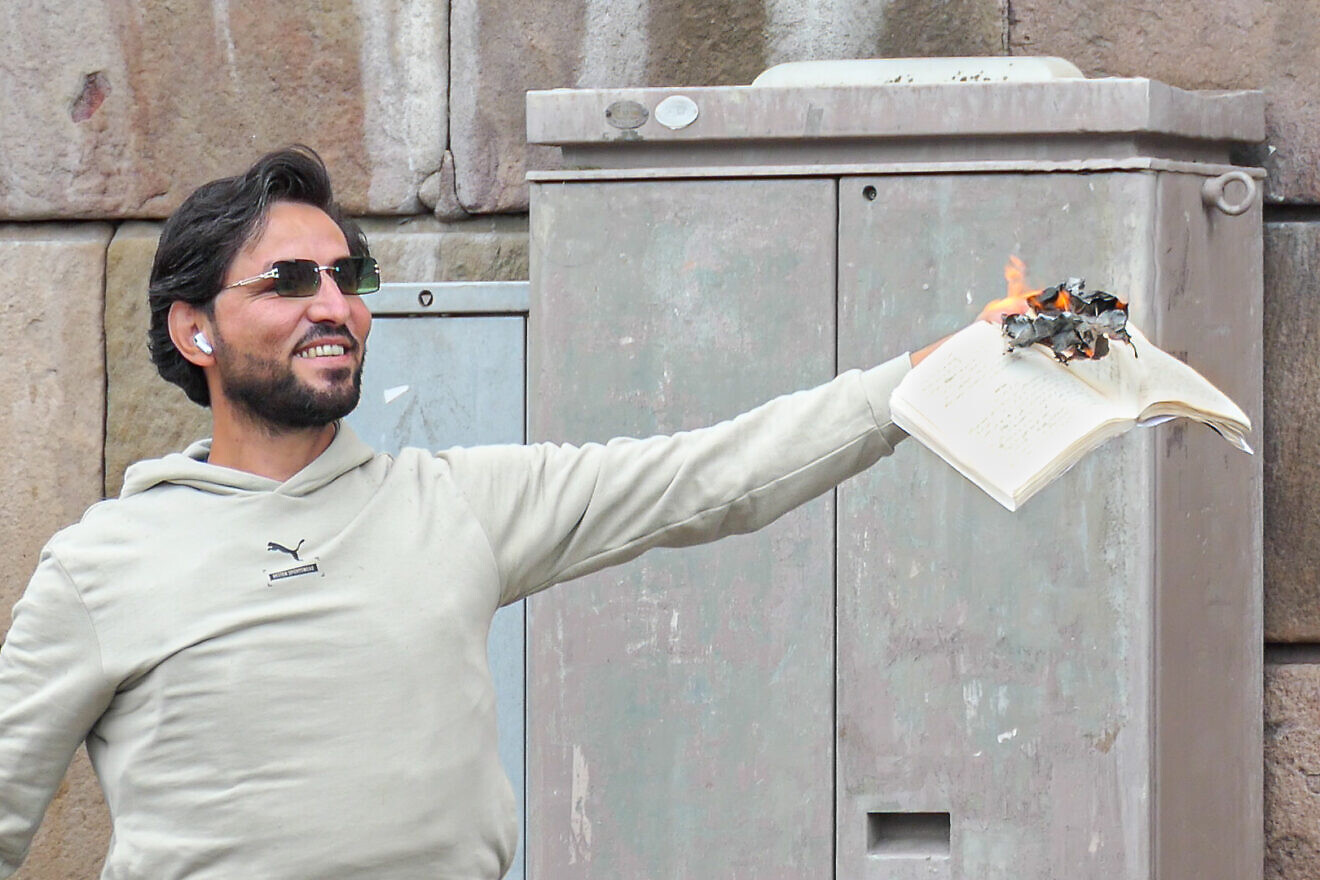The shocking and controversial figure Salwan Momika, who gained international notoriety in 2023 for repeatedly burning copies of the Quran, has been shot dead in Sweden.
The incident has stirred fresh debates and global reactions, reigniting discussions about freedom of expression, hate speech, and religious sensitivities. The news comes just as a Stockholm court was preparing to deliver a ruling on whether Momika’s actions constituted incitement to ethnic hatred.
Momika, an Iraqi Christian immigrant residing in Sweden, had become a polarizing figure for his provocative demonstrations, which involved burning the Islamic holy book in public spaces.
These acts triggered widespread protests and condemnation, particularly from Muslim-majority nations, as they perceived his actions as deeply offensive and inflammatory. His death under such circumstances has added another layer of complexity to an already contentious issue.
The Controversial Figure and His Protests
Salwan Momika’s public Quran burnings were widely covered by media outlets around the world. He defended his actions as a form of free speech, arguing that they were meant to criticize what he described as “oppressive ideologies.”
However, his demonstrations provoked outrage and strong condemnation from Muslim communities, governments, and international organizations.
Muslim-majority countries, including Turkey, Iran, Saudi Arabia, and Pakistan, lodged formal protests with Sweden, demanding that it curb such acts under the banner of religious tolerance.
Read : Open Quran, Bomb-Making Materials Found at Home of New Orleans Attacker Who Killed 15
In response to international backlash, Sweden’s government faced diplomatic challenges, with protests erupting in various nations, embassies being targeted, and calls for boycotts of Swedish products gaining momentum.
Read : Tourist Killed by Mob for Allegedly Desecrating Quran in Pakistan’s Swat
Momika’s actions also sparked intense debates within Sweden, where the country’s commitment to free speech clashed with growing concerns about hate speech and societal polarization. The Swedish government faced criticism both for allowing his demonstrations to proceed and for the perceived inadequacy of their response to the backlash.
The Shooting and Its Aftermath
On January 31, 2025, Swedish police were alerted to a shooting in the city of Södertälje, where Salwan Momika resided. The incident took place indoors, and authorities discovered a man who had been critically injured by gunshots. Despite efforts to save his life, Momika was declared dead shortly after being taken to the hospital.
Police have launched an investigation into the shooting, with initial findings suggesting it was a targeted attack. No suspects have been arrested so far, and authorities have refrained from speculating about the motive behind the killing.
However, given Momika’s controversial public profile, many believe that the shooting could be linked to his Quran-burning activities, though police have yet to confirm this connection.

The timing of Momika’s death adds another layer of intrigue. A Stockholm court was scheduled to rule on February 1, 2025, on whether Momika’s Quran-burning protests constituted incitement to ethnic hatred.
However, following his death, the court announced that it would delay the ruling until February 3 to allow more time for deliberation. The legal proceedings now hang in the balance, as the court must decide whether to proceed with the case posthumously or dismiss it altogether.
Global Reactions and Implications
Momika’s death has elicited mixed reactions globally. Some view it as a tragic end to a man who exercised his right to free speech, however controversial his actions may have been. Others see it as a grim reminder of the deep divisions and tensions surrounding issues of religion, identity, and freedom of expression in a rapidly globalizing world.
In Sweden, the incident has reignited debates about the balance between protecting free speech and preventing hate speech. Politicians, activists, and legal experts are grappling with questions about how to handle provocative acts that test the limits of democratic freedoms while avoiding the risk of societal unrest.
Internationally, the reaction has been equally polarized. Supporters of Momika’s actions have condemned his killing as an attack on free speech, with some calling for an investigation into whether the shooting was motivated by religious or political factors.
On the other hand, critics argue that his death underscores the consequences of provoking deeply held religious sentiments, suggesting that it should serve as a cautionary tale for those who seek to inflame tensions.
Broader Context: Freedom of Expression vs. Hate Speech
The controversy surrounding Salwan Momika’s Quran burnings highlights the ongoing struggle to navigate the boundaries of free speech in multicultural and pluralistic societies. In many Western countries, freedom of expression is a protected right, often considered a cornerstone of democracy.
However, acts like Quran burnings test the limits of this freedom, raising questions about when free speech becomes hate speech and whether such acts should be restricted in the interest of social harmony.

Critics of Momika’s demonstrations argue that his actions amounted to deliberate provocation, designed to incite hatred and division. They point to the violent protests and diplomatic fallout that followed his demonstrations as evidence of the harm caused by his actions.
Proponents, however, contend that restricting such acts sets a dangerous precedent, potentially stifling dissent and curbing legitimate criticism of religious or ideological systems.
Sweden, like many other countries, has struggled to find a legal and social consensus on this issue. Its decision to allow Momika’s protests to proceed, citing the country’s strong commitment to free speech, drew praise from some quarters but condemnation from others.
The fallout from these events continues to shape debates about the limits of free expression and the responsibilities that come with it.
Unanswered Questions and Future Challenges
As the investigation into Salwan Momika’s death unfolds, many questions remain unanswered. Was the shooting a targeted attack motivated by his controversial actions, or was it unrelated to his public profile? How will Swedish authorities handle the case moving forward, and what impact will it have on the country’s legal and social landscape?
Momika’s death also raises broader questions about the role of individuals and governments in addressing religious sensitivities in an increasingly interconnected world.
How can societies balance the right to free speech with the need to prevent hate speech and maintain social cohesion? What responsibilities do governments and institutions have in mediating conflicts that arise from deeply held beliefs and values?
While these questions have no easy answers, they underscore the complexities and challenges of living in a diverse and globalized world. Salwan Momika’s life and death serve as a stark reminder of the tensions that can arise when freedom of expression intersects with religious and cultural sensitivities.
As the world continues to grapple with these issues, Momika’s story will likely remain a touchstone for debates about the limits of free speech, the consequences of provocation, and the enduring importance of finding common ground in a divided world.

